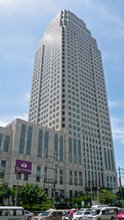
Capital controls did not deter speculation.
The Bank of Thailand should completely terminate the 30% reserve requirement on short-term capital inflows because lower interest rates and the central bank's intervention capabilities are effectively stabilising the exchange rate, says a senior financial expert. Olarn Chaipravat, a former Siam Commercial Bank president and honorary adviser to the Fiscal Policy Research Institute, said the capital controls were not necessary because they had not prevented baht speculation.
Policymakers had to exempt stocks and foreign direct investments from the measures immediately after the Dec 18 announcement of the controls when the Stock Exchange of Thailand dropped 15% in a single day.
The Bank of Thailand still requires a reserve for capital inflows investing in the bond market.
Dr Olarn said the central bank had intervened in the currency markets by issuing bonds to purchase US dollars and by cutting benchmark interest rates by 1.5 percentage points since the beginning of the year, which also helped stabilise foreign exchange rates.
The schemes have stabilised the baht at 34-35 baht against the US dollar.
Furthermore, Dr Olarn said, the Finance Ministry approved the framework for the Bank of Thailand to issue additional bonds worth 400 billion baht for further intervention.
''As a result, the existence of the 30% reserve requirement measure is no longer necessary.''
Thailand's official reserves stand at US$96 billion, of which $70 billion are held by the Bank of Thailand and $20 billion by commercial banks.
He said that total official reserves were too high _ particularly the $20 billion held by banks. He argues that private reserves should be allocated for overseas investment.
In another development, Dr Olarn reported that a recent survey of 75 industrialists, 50 public servants and researchers and 25 bankers showed that 70% expected the baht to appreciate to 34 baht to the US dollar by the year-end.
He said the result was not surprising given ongoing current account surpluses.
In the first half of 2007, Thailand's current account surplus was $6 billion and net capital flows were $3 billion.
Dr Olarn expects a current account surpluses in the second half at $3 billion and net capital flows around $2 billion.
The baht appreciation has hurt export industries such as textiles and furniture. The exchange rate has benefited sectors that consume a great deal of imported materials and sell most of their products locally, for instance, the steel and oil industries.
''The baht's appreciation only had a small impact on export volumes of commodities and near-commodity products, while the minimum wage remains stable or has even increased, so the production cost of export-oriented industries rises, inevitably,'' said Dr Olarn.
''It is useless to ask the government and the central bank to push down the baht's value by 10% and reduce minimum wages. Therefore, industrialists should concentrate on human resources training, improving efficiency of production machinery and technologies and building their brands.''
Dr Olarn suggested that businesses that could not improve factors of production should relocate their plants to lower-cost countries, including Vietnam, Laos and Cambodia.
Source: Bangkok Post


No comments:
Post a Comment